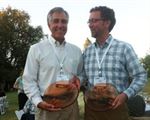
 Making an entire campus sustainable takes a lot of planning, education and work.
Making an entire campus sustainable takes a lot of planning, education and work.
But those efforts are what earned two of UC Merced’s sustainability leaders systemwide recognition.
Former Director of Energy and Sustainability John Elliott and Special Assistant to the Vice Chancellor for Administration Jim Genes, called a “dynamic duo” by the committee that honored them, won the 2012 UC Sustainability Champion award at the 11th annual California Higher Education Sustainability Conference earlier this summer.
The conference highlights applied research and case studies with proven success. It’s organized by the University of California, the California State University system, the state’s community colleges and independent and private colleges.
This year’s conference was held at UC Davis. Each college system recognizes its own sustainability leaders in a variety of categories, and Elliott said being honored by this group of peers lends that much more weight to winning the award.
“This group of people is incredibly accomplished,” Elliott said. “So this award really means a lot.”
Together, Genes and Elliott, who left UC Merced this summer to become the chief sustainability officer at Lawrence Berkeley National Laboratory, have worked together across many different campus venues to set in place wide-ranging sustainability, energy and water efficiency goals.
The campus made a “Triple Zero Commitment” to consume zero net energy through efficiency and renewable energy production; to produce zero landfill waste by reducing excess consumption and composting or recycling as much as possible; and to produce zero net greenhouse gas emissions by offsetting as much carbon emissions as it produces. Elliott said the campus is well on its way to meeting the goals, and will likely come in ahead of schedule on some.
“The campus has a very aggressive sustainability strategy,” Elliott said, focusing on energy efficiency, renewable energy, and sustainable practices in every facet, from construction and operations to behavior on campus.
“Our campus is a living laboratory where we are piloting sustainable strategies for growing communities,” Genes said. “We’re implementing solutions that are affordable, scalable and can be copied by other communities.”
For example, the campus sets energy performance targets for every building that carry through from design into operations. It’s done at minimal up-front cost, saves the campus about $1.5 million annually and could be put into wider practice, Elliott said.
On the research side, faculty members are looking at more efficient ways of trapping and converting solar rays, better ways of predicting rainfall and snowpack to address distribution issues, and cleaner biomass gasification to turn campus waste into fuel.
While sustainability is not a new goal for any of the UC campuses, UC Merced is set apart because of its facilities, Genes said. It’s also where UC Merced has an advantage, because all the construction is new. The campus has been able to erect energy-efficient buildings from the start, rather than having to retrofit, as the older campuses do.
From the campus’ solar array and its recycling program to its water reuse and conservation programs and activities, Elliott and Genes and many others they have worked with over the years have led UC Merced down some cutting-edge paths, and it’s the accumulation of their work for which they were recognized.
“As co-chairs of the Chancellor’s Advisory Committee on Sustainability, (Genes and Elliott) led the development of a model sustainability strategic plan that also includes goals for zero net energy and zero waste by 2020. At the same time, they worked with Tom Lollini and other campus leaders to enshrine this ‘Triple-Zero’ commitment in the UC Merced Long-Range Development Plan. That plan, and the fact that the campus is tracking metrics that demonstrate that they are on track to meet these visionary goals, won one of the AIA Top 10 Awards for sustainable architecture, which is a unique accolade for a planning document,” the awards committee said through presenter Patrick Lenz. “For their leadership in carrying forward the vision of UC Merced’s founders to make it one of the most sustainable campuses in the world; for their leadership within the UC system on clean energy and climate action; for the progress on sustainable water systems in the UC system and at this conference that wouldn’t have been possible without them; and, for approaching every sustainability challenge with a positive, can-do, teamwork-oriented attitude, I am proud and honored to present this year’s UC Sustainability Champion Award to John Elliott and Jim Genes of UC Merced.”
Lorena Anderson

Senior Writer and Public Information Representative
Office: (209) 228-4406
Mobile: (209) 201-6255






